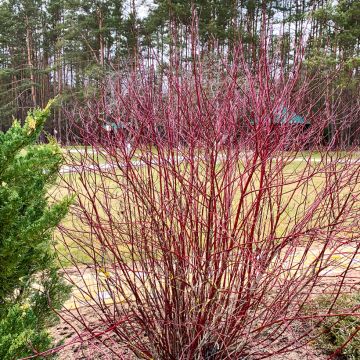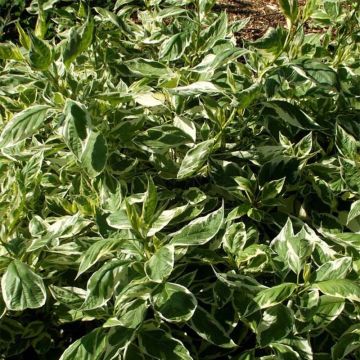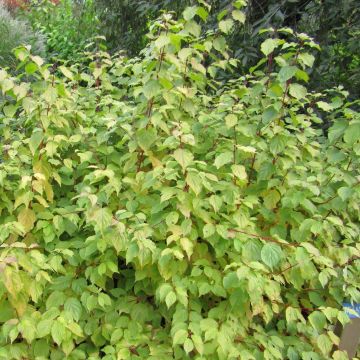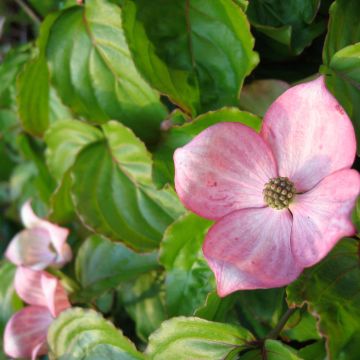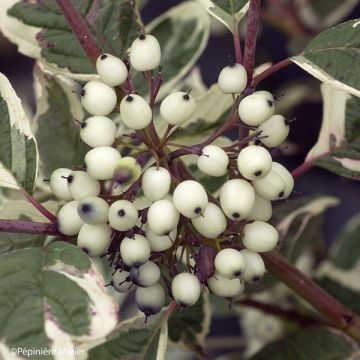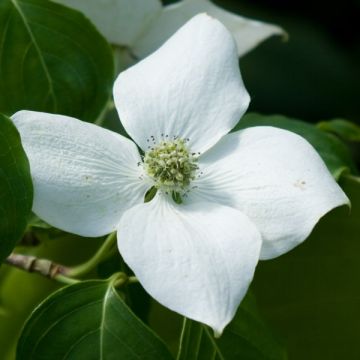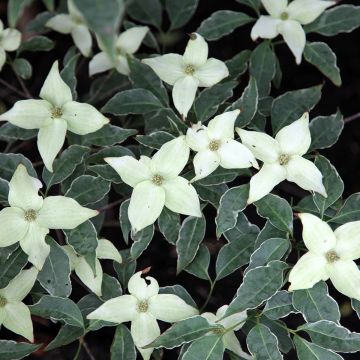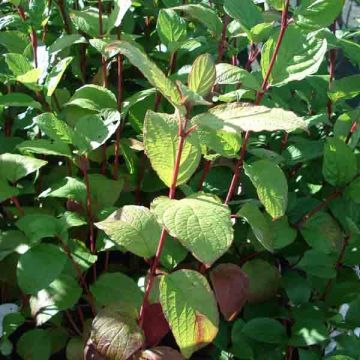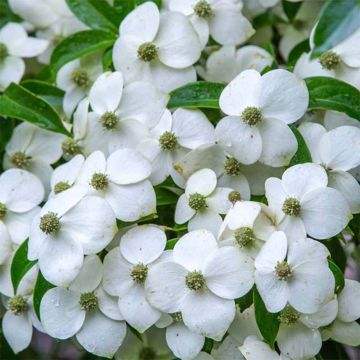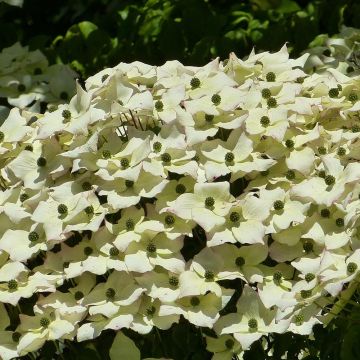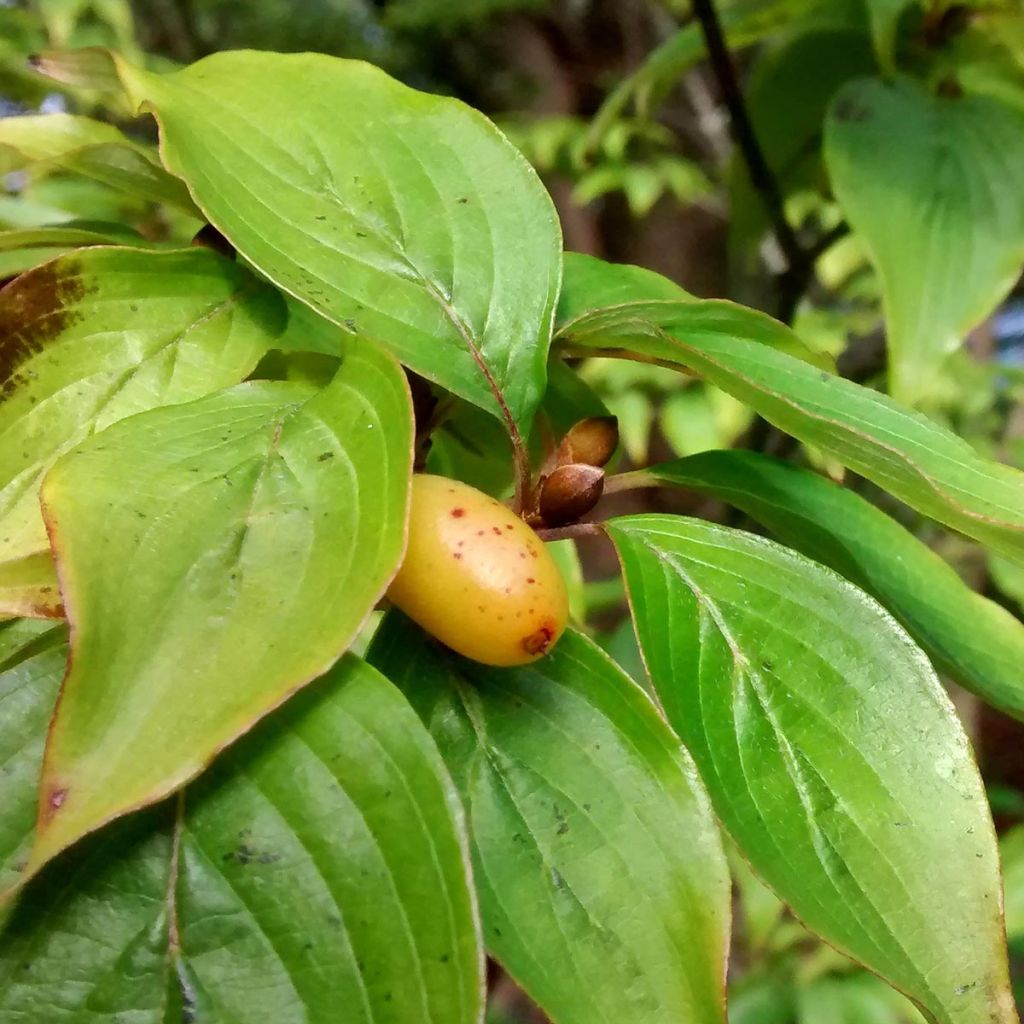

Cornus officinalis Robins Pride - Japanese Cornelian Cherry
Cornus officinalis Robins Pride - Japanese Cornelian Cherry
Cornus officinalis Robin's Pride
Japanese Cornelian Cherry
This item cannot be shipped to the selected country
Oversize package delivery charge from €6.90
More information
Schedule delivery date,
and select date in basket
This plant carries a 24 months recovery warranty
More information
We guarantee the quality of our plants for a full growing cycle, and will replace at our expense any plant that fails to recover under normal climatic and planting conditions.
Oversize package: home delivery by special carrier from €6.90 per order..
Express home delivery from €8.90.
Does this plant fit my garden?
Set up your Plantfit profile →
Description
Cornus officinalis 'Robin's Pride', also known as cornelian cherry, is a variety of Japanese cornelian cherry that stands out for its broad and upright pyramid habit with a more dominant central leader than the species, giving it a charming small tree-like silhouette! It is covered in beautifully curved dark green ovate leaves, which turn yellow and then deep purple-red before falling. Its shiny reddish-brown bark peels off in plates, giving its trunk a unique texture. Its spring flowering is one of the earliest of the year, occurring as early as February in the form of numerous dense clusters of small golden-yellow honey-scented flowers, covering the entire length of its bare branches. They are followed by oblong bright red berries that are highly appreciated by birds. Hardy and undemanding, it can be planted in full sun or partial shade in well-drained soils, preferably limestone. Use this ornamental variety throughout the seasons as a focal point in a small wildlife garden!
The Japanese Cornelian cherry is a large deciduous shrub native to China and Korea, long introduced into Japanese gardens. The 'Robin's Pride' selection was imported by the Netherlands. It grows fairly quickly and has a tree-like habit, composed of one or more short trunks and a bushy, open crown, slightly taller than wide. At maturity, it will reach an average height of 5m (16 ft 5 in) and a spread of 3m (9 ft 10 in) in our gardens. Flowering takes place in the heart of winter or late winter depending on the climate, from February to March. On the bare branches clusters of small yellow 4-petaled highly fragrant flowers appear at the axils of the leaf buds. After pollination, they give way to small fleshy, bright red, edible fruits. The branches bear entire, ovate leaves crossed by 7 prominent veins. They are light green in spring and summer, then take on beautiful shades ranging from orange-yellow to deep purple-red, especially when the shrub is exposed to the sun. Finally, the bark of Cornus officinalis, which is rather grey-beige, peels off strongly, revealing cinnamon to orange bark plates.
This Japanese cornelian cherry is a beautiful and easy-to-grow shrub that brings life to the garden in winter. It is not very demanding regarding soil type and only requires a sunny exposure. The more tree-like compact habit of the 'Robin's Pride' variety makes it interesting for planting as a specimen or for embellishing a smaller garden. Place it not too far from the house or garden entrance: it will welcome visitors with elegance and distinction throughout the year, except perhaps in summer. To accompany it, you can choose summer-flowering shrubs such as a large botanical rose, a mock orange, or a butterfly bush. All these characteristics make it an excellent shrub for a natural garden.
Report an error about the product description
Cornus officinalis Robins Pride - Japanese Cornelian Cherry in pictures




Plant habit
Flowering
Foliage
Botanical data
Cornus
officinalis
Robin's Pride
Cornaceae
Japanese Cornelian Cherry
Cultivar or hybrid
Other Cornus
Planting and care
Cornus officinalis is easy to grow and requires little maintenance, pruning is unnecessary unless you want to train it as a small tree. It tolerates ordinary soil that is not too dry and deep, but it must be well-drained, and it prefers chalky soils. Plant it in a sunny position to enhance the foliage colours in autumn, or in partial shade. It is very hardy, resistant to -25°C (-13 °F).
Planting period
Intended location
Care
-
, onOrder confirmed
Reply from on Promesse de fleurs
Haven't found what you were looking for?
Hardiness is the lowest winter temperature a plant can endure without suffering serious damage or even dying. However, hardiness is affected by location (a sheltered area, such as a patio), protection (winter cover) and soil type (hardiness is improved by well-drained soil).

Photo Sharing Terms & Conditions
In order to encourage gardeners to interact and share their experiences, Promesse de fleurs offers various media enabling content to be uploaded onto its Site - in particular via the ‘Photo sharing’ module.
The User agrees to refrain from:
- Posting any content that is illegal, prejudicial, insulting, racist, inciteful to hatred, revisionist, contrary to public decency, that infringes on privacy or on the privacy rights of third parties, in particular the publicity rights of persons and goods, intellectual property rights, or the right to privacy.
- Submitting content on behalf of a third party;
- Impersonate the identity of a third party and/or publish any personal information about a third party;
In general, the User undertakes to refrain from any unethical behaviour.
All Content (in particular text, comments, files, images, photos, videos, creative works, etc.), which may be subject to property or intellectual property rights, image or other private rights, shall remain the property of the User, subject to the limited rights granted by the terms of the licence granted by Promesse de fleurs as stated below. Users are at liberty to publish or not to publish such Content on the Site, notably via the ‘Photo Sharing’ facility, and accept that this Content shall be made public and freely accessible, notably on the Internet.
Users further acknowledge, undertake to have ,and guarantee that they hold all necessary rights and permissions to publish such material on the Site, in particular with regard to the legislation in force pertaining to any privacy, property, intellectual property, image, or contractual rights, or rights of any other nature. By publishing such Content on the Site, Users acknowledge accepting full liability as publishers of the Content within the meaning of the law, and grant Promesse de fleurs, free of charge, an inclusive, worldwide licence for the said Content for the entire duration of its publication, including all reproduction, representation, up/downloading, displaying, performing, transmission, and storage rights.
Users also grant permission for their name to be linked to the Content and accept that this link may not always be made available.
By engaging in posting material, Users consent to their Content becoming automatically accessible on the Internet, in particular on other sites and/or blogs and/or web pages of the Promesse de fleurs site, including in particular social pages and the Promesse de fleurs catalogue.
Users may secure the removal of entrusted content free of charge by issuing a simple request via our contact form.
The flowering period indicated on our website applies to countries and regions located in USDA zone 8 (France, the United Kingdom, Ireland, the Netherlands, etc.)
It will vary according to where you live:
- In zones 9 to 10 (Italy, Spain, Greece, etc.), flowering will occur about 2 to 4 weeks earlier.
- In zones 6 to 7 (Germany, Poland, Slovenia, and lower mountainous regions), flowering will be delayed by 2 to 3 weeks.
- In zone 5 (Central Europe, Scandinavia), blooming will be delayed by 3 to 5 weeks.
In temperate climates, pruning of spring-flowering shrubs (forsythia, spireas, etc.) should be done just after flowering.
Pruning of summer-flowering shrubs (Indian Lilac, Perovskia, etc.) can be done in winter or spring.
In cold regions as well as with frost-sensitive plants, avoid pruning too early when severe frosts may still occur.
The planting period indicated on our website applies to countries and regions located in USDA zone 8 (France, United Kingdom, Ireland, Netherlands).
It will vary according to where you live:
- In Mediterranean zones (Marseille, Madrid, Milan, etc.), autumn and winter are the best planting periods.
- In continental zones (Strasbourg, Munich, Vienna, etc.), delay planting by 2 to 3 weeks in spring and bring it forward by 2 to 4 weeks in autumn.
- In mountainous regions (the Alps, Pyrenees, Carpathians, etc.), it is best to plant in late spring (May-June) or late summer (August-September).
The harvesting period indicated on our website applies to countries and regions in USDA zone 8 (France, England, Ireland, the Netherlands).
In colder areas (Scandinavia, Poland, Austria...) fruit and vegetable harvests are likely to be delayed by 3-4 weeks.
In warmer areas (Italy, Spain, Greece, etc.), harvesting will probably take place earlier, depending on weather conditions.
The sowing periods indicated on our website apply to countries and regions within USDA Zone 8 (France, UK, Ireland, Netherlands).
In colder areas (Scandinavia, Poland, Austria...), delay any outdoor sowing by 3-4 weeks, or sow under glass.
In warmer climes (Italy, Spain, Greece, etc.), bring outdoor sowing forward by a few weeks.

































